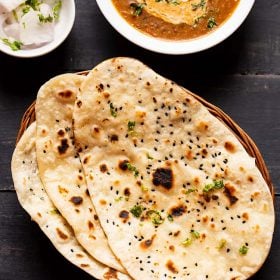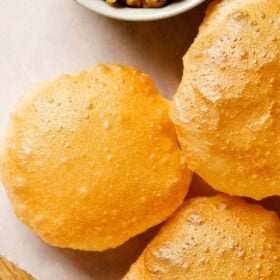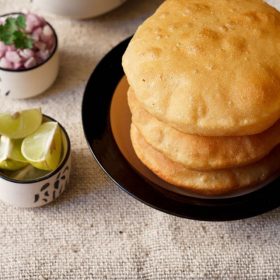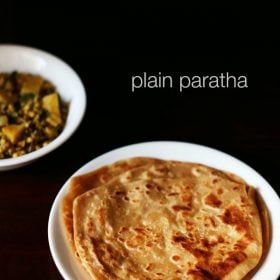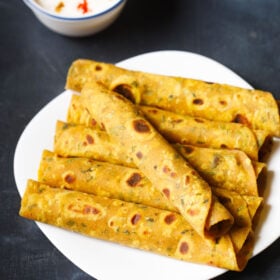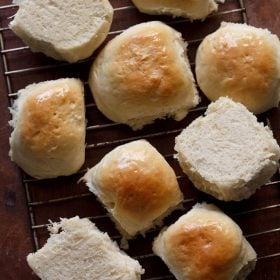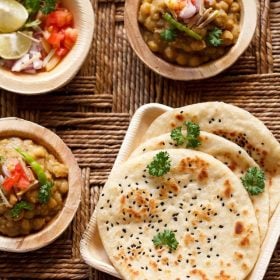The classic Indian flatbread Kulcha is best enjoyed with a robust Punjabi Chana Masala. This combination was, is and will always remain a winner! So, in this post, I’ve got my Kulcha Bread for you to try at home. It is a fact that Amritsar in Punjab houses the best kulchas in the world. But this Kulcha recipe of mine can also give a tough competition to them! Try it.
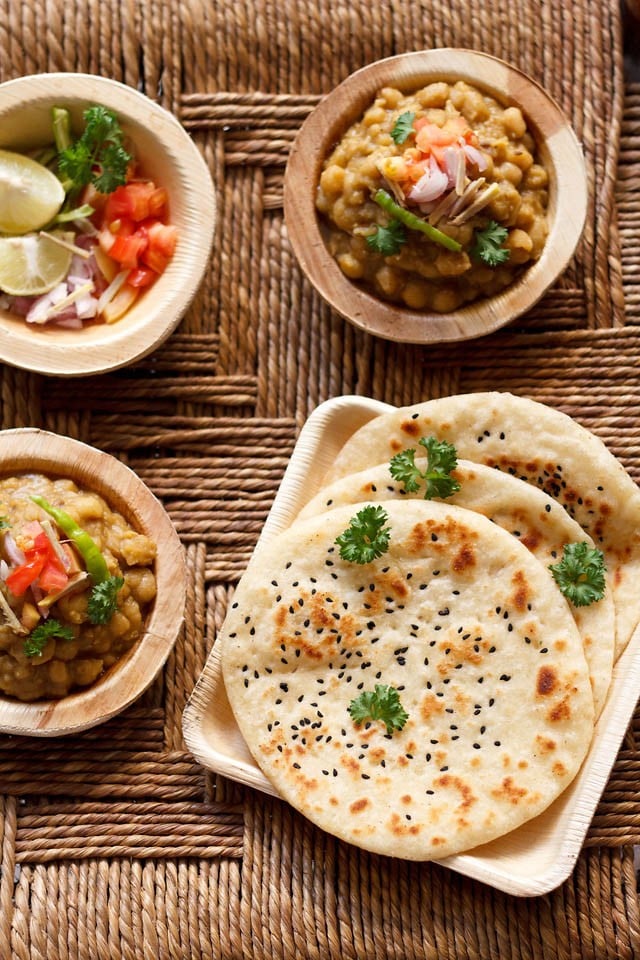
Table of Contents
What is Kulcha
A popular and famous leavened flatbread from Punjab in North India, it can be plain or stuffed, and can be made in the tandoor (clay oven), baked in an oven or cooked on a tawa or skillet.
Apart from Punjab, it is found in the food cultures of Jammu and Kashmir, Himachal Pradesh, Haryana and Uttar Pradesh.
This soft-textured flatbread is easy to prepare and tastes divine. You just need to be a little patient till the dough leavens. I have cooked these on a tawa, but you can also bake them in an oven. Best, if you have a tandoor at home, use it.
This flatbread recipe does not use yeast in its leavening. This Kulcha recipe has curd, baking soda and baking powder which helps in the process of leavening the dough.
Since I’m not a fan of the soapy smell of baking soda, I’ve used it in less quantity in this Kulcha recipe. Thus, added baking powder too. Paneer Kulcha and Aloo Kulcha are some of my favorite stuffed kulchas.
Whether plain or stuffed, kulchas taste best when paired with Amritsari Chole, Chana Masala or even Pindi Chole. You can also have them warm with a cup of tea or coffee.
I also love the Delhi style Matar Kulcha – a combination of kulcha with a tasty matar curry made with dried white peas.
If you like this pairing too, then you must try the quintessential Chole Bhature and the Bengali special Luchi with Alur Dom (Aloo Dum) too at home.
How to make Kulcha
Make Dough
1. Mix 2.5 cups all-purpose flour (maida), ¾ teaspoon salt, 2 to 2.5 teaspoons sugar, ½ teaspoon baking powder and ¼ teaspoon baking soda in a bowl. Make a well in the center.
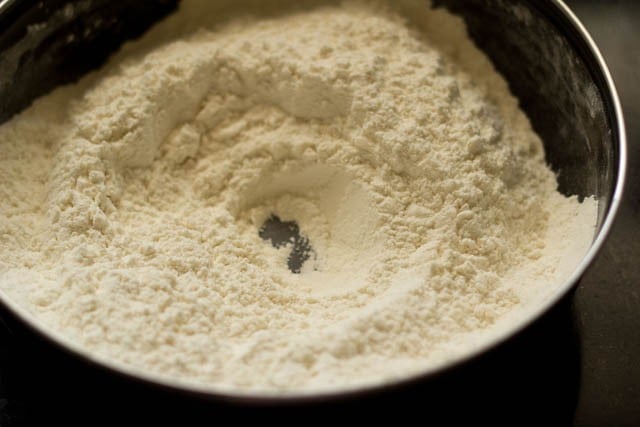
2. Add 4 tablespoons yogurt (curd), 2.5 tablespoons oil and approximately ¾ cup water.
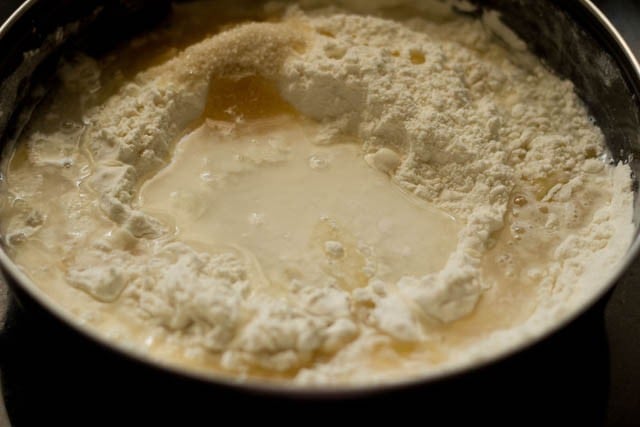
3. Begin to mix the flour with the liquids first and then start to knead.
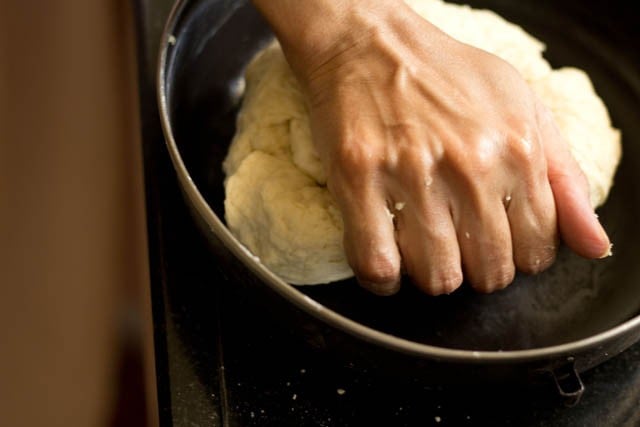
4. Make a smooth, supple and soft dough.
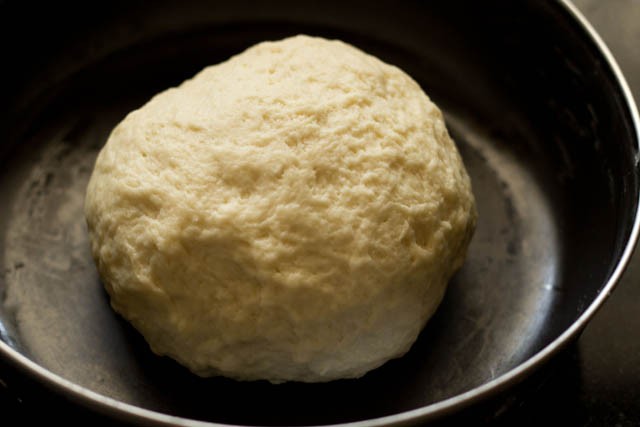
5. In the same bowl or pan, cover the dough with a wet kitchen napkin. You can also lightly brush some water on the dough and cover the pan with a lid.
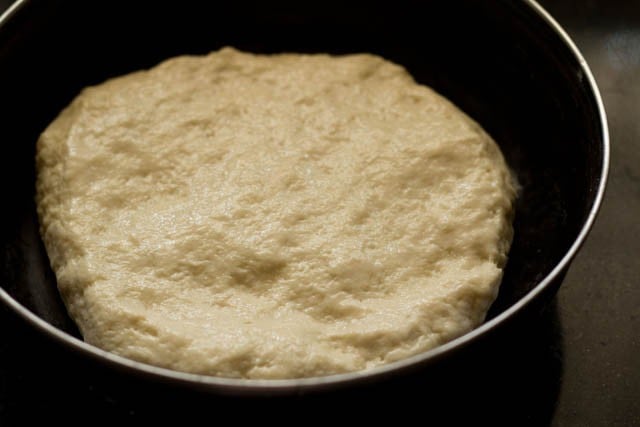
6. Let the dough leaven for 2 hours.
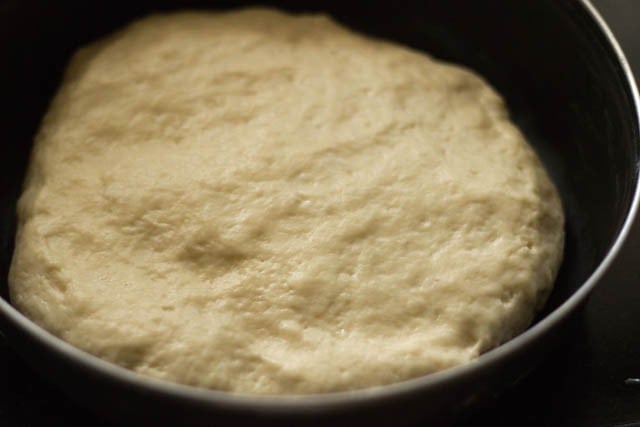
7. Lightly knead the leavened dough again.
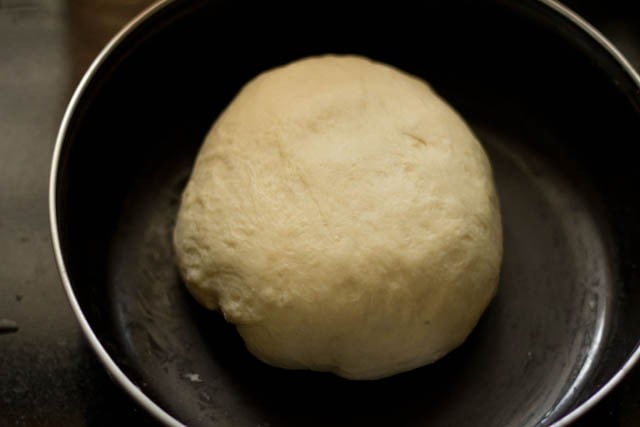
Roll and Make Kulcha
8. Make small balls of the dough and lightly flatten them. Sprinkle some nigella seeds or sesame seeds on the dough ball.
With the rolling pin, flatten the dough and roll each into a small-sized kulcha on a lightly dusted rolling board.
Do not roll thinly but keep a medium thickness – like a paratha or bit more thick than a paratha.
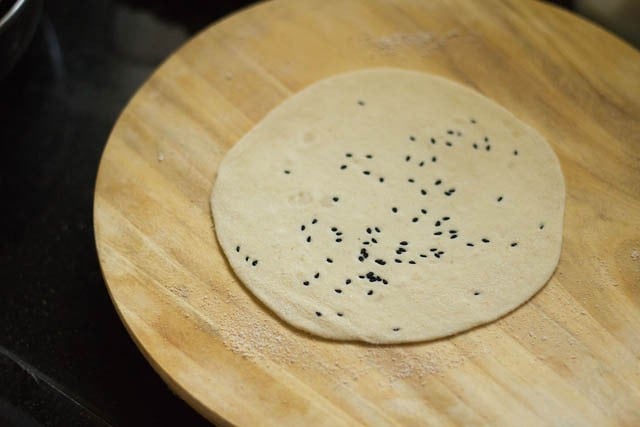
9. Heat a skillet or tawa on medium-high to high heat. The tawa or skillet has to be very hot. Place the kulcha on the tawa.
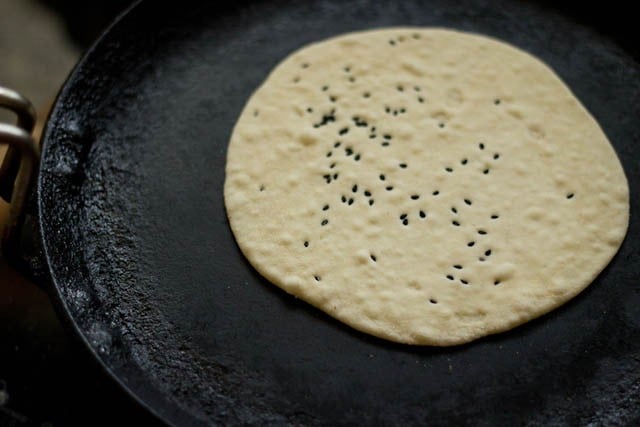
10. Cook one side partially till it is ¼ᵗʰ cooked.
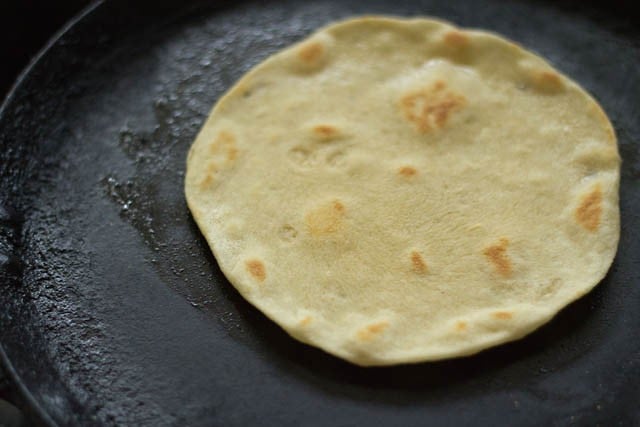
11. Flip and cook the other side till it is ½ cooked. Apply oil or ghee on both sides of kulcha while cooking.
You can skip the oil or ghee if you prefer.
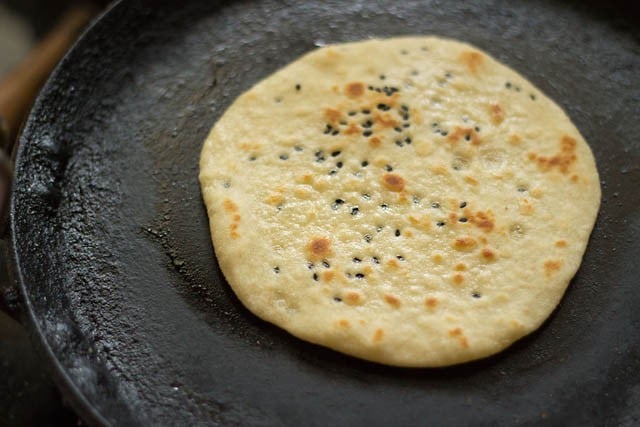
12. Flip a few times as needed and roast till the kulcha gets golden spots and is evenly cooked. Prepare more kulchas in a similar way.
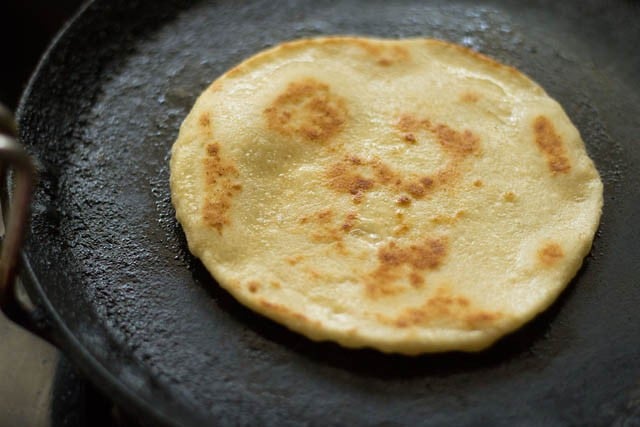
13. Serve the Kulcha hot with chickpea curry or chole masala. These can also be stacked in a roti basket and then served warm.
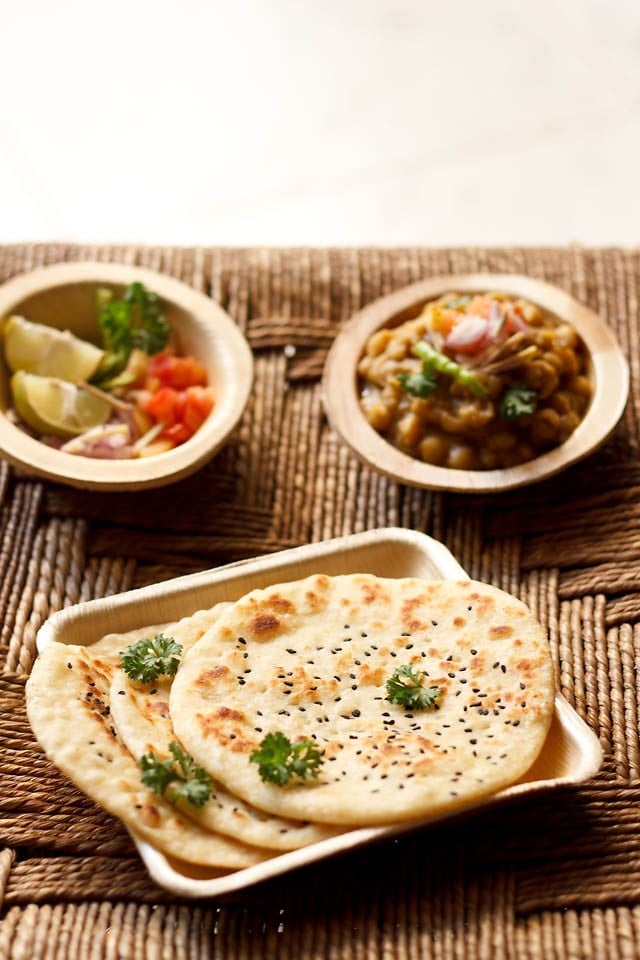
Kulcha Vs Naan
Kulcha and naan are the two most admired flatbreads across India, even the world too. However, both these are unique in their nature.
While both can be stuffed or plain, when we talk of the differences between the two, it is majorly in the ingredients, leavening agents, spices used for each and also the texture and thickness. In short,
- The base flour in kulcha is essentially all-purpose flour (maida) and in naan is either all-purpose flour or a mix of both whole wheat flour and all-purpose flour. Naan can also be made only with whole wheat flour.
- Kulcha is leavened with baking soda, baking powder or both and also yeast. Naan is leavened with yeast.
- Naan can be rolled thin or having a medium thickness, to a tear drop shape and cooked in a tandoor. They have a soft or chewy texture. While a Kulcha can be rolled thick or thin and has a soft or fluffy texture. Some versions of kulcha also have a flaky texture.
One of the similarities between them is that both Kulcha Bread and Naan are either prepared in a tandoor, and can also be made in an oven and tawa.
Kulcha Variations
As we travel through the length and breadth of the Indian subcontinent, we can find the humble Kulcha with many of its variants apart from the Amritsari one. Read on to know more.
- When milk or curd (yogurt) is used instead of water to knead the dough, resulting in a more softer kulcha. This type is also referred to as Doodhia Kulcha. The fluffy Lucknowi ones are also kneaded with milk and ghee.
- One more stuffed version is the Kalari Kulcha, popular on the streets of Jammu – with a crispy, grilled stuffing of the traditional Dogri cheese or the Kaladi cheese – also called Maish Krej in Kashmiri. Due to the cheese, this has a stretchy texture.
- Some of the other all-time favorite stuffings include potato, onions, paneer (Indian cottage cheese), cauliflower, mint leaves, other seasonal vegetables and greens.
Expert Tips
- Make sure to knead the dough soft and smooth or else the Kulcha Bread will turn out chewy.
- While making the dough for this Kulcha recipe, the amount of water to be added depends on the quality of flours. So, add accordingly.
- For best results, keep the dough in a warm environment for leavening.
- To get a restaurant style texture on the Kulcha, the tawa or skillet should be very hot while roasting it.
- Make sure to wipe the tava with a cotton kitchen towel after making each kulcha to get rid of burnt flour particles.
- This is a vegetarian recipe. But you can even make it vegan by using a plant-based yogurt like almond or cashew yogurt, and roasting it in oil instead of ghee.
FAQs
Yes, you can use the same quantity of atta instead of maida. Knead the atta with ¾ cup water first and then add more water if required, to get a smooth soft dough. As compared to maida, atta requires more water while kneading.
Yes, you can make Kulcha Bread in oven at 220 to 250 degrees Celsius. Preheat your oven for 15 minutes before baking.
Yes, you can.
No. It is slightly thicker than roti or chapati, more like an aloo paratha.
Yes, the kulcha dough can be prepared and refrigerated to store overnight. Spread some oil on the dough and store in an airtight steel box.
There is no substitute for nigella seeds. However, you can skip it, if you don’t have or use black or white sesame seeds.
Since the recipe has curd in it and the kulchas are cooked on tawa and not baked, you can store them in the refrigerator for just one day.
An unleavened flatbread is a paratha and a leavened flatbread is a kulcha. Traditionally, kulchas are made in a tandoor or clay oven and baked kulcha bread can be stored for many days.
Yes, this recipe can easily be halved.
It takes about 6 to 8 minutes approximately.
Sugar is added in this recipe as it helps in leavening of the dough.
More Indian Breads To Try!
Indian Breads
Indian Breads
Indian Breads
North Indian Food Recipes
Please be sure to rate the recipe in the recipe card or leave a comment below if you have made it. For more vegetarian inspirations, Sign Up for my emails or follow me on Instagram, Youtube, Facebook, Pinterest or Twitter.
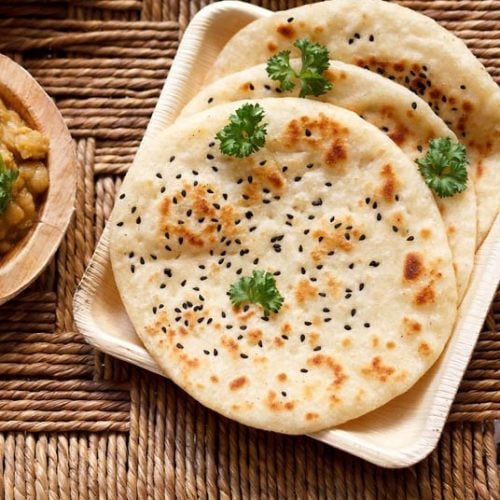
Kulcha Recipe | Kulcha Bread
Ingredients
- 2.5 cups all-purpose flour (maida)
- 4 tablespoons Curd (yogurt) or 3 tablespoon yogurt + 1 tablespoon milk. can use cashew yogurt
- ½ teaspoon baking powder
- ¼ teaspoon baking soda
- ¾ cup water – for kneading, add more if required
- 2 to 2.5 teaspoons sugar
- ¾ teaspoon salt or as required
- 2.5 tablespoons oil or ghee
- some oil or ghee or butter for roasting
- extra flour – for dusting
- 1 to 2 tablespoons nigella seeds (kalonji) or sesame seeds
Instructions
Making dough
- Mix the all-purpose flour, salt, sugar, baking powder and baking soda in a bowl.
- Make a well in the center. Add the yogurt, oil and water.
- Begin to mix the flour with the liquids first and then start to knead. Make a smooth, soft and supple dough.
- In the same bowl or pan, cover the dough with a wet kitchen napkin and let the dough rest for 2 hours.
Rolling and making kulcha
- Make small balls of the dough and flatten them a bit. Sprinkle some nigella seeds or sesame seeds on the dough ball.
- With the rolling pin, flatten the dough and roll each into a small-sized kulcha. Do not roll thin but have a medium thickness similar to a paratha or slightly thicker than paratha.
- Heat a flat skillet or a tawa. Place the kulcha on the hot tawa.
- Cook one side partially till its ¼ᵗʰ cooked. Flip and cook the other side till it is ½ cooked.
- Apply oil or ghee on both sides of kulcha while roasting. You can skip the oil or ghee if you prefer.
- Flip a few times as needed and roast the kulcha till it gets golden spots and is evenly cooked. Prepare more kulchas in a similar way.
- As you prepare them, stack the cooked kulcha in a roti-basket, so that they stay warm.
- Serve Kulcha hot with chana masala.
Video
Notes
- Instead of using only all-purpose flour, opt to add equal portions of whole wheat flour and all-purpose flour.
- You can also bake kulcha at 220 to 250 degrees Celsius until they have some charred spots on them and are evenly cooked. Preheat oven for 15 minutes before baking.
- The recipe can be halved or doubled.
Nutrition Info (Approximate Values)
This Kulcha Recipe from the blog archives first published in June 2013 has been updated and republished on December 2022.
